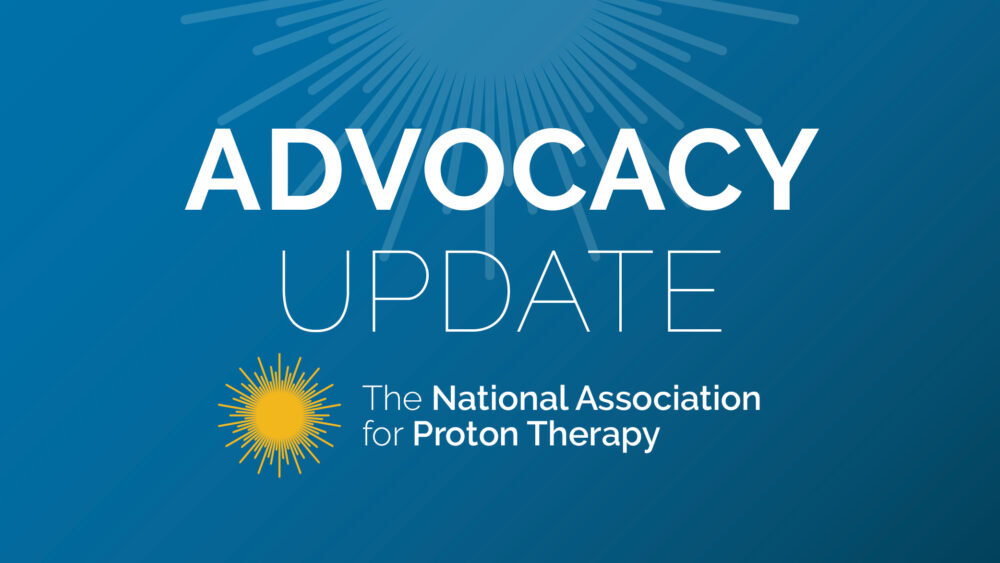Building on the groundwork laid in previous years, NAPT continued its aggressive federal advocacy this year. Consistent with NAPT’s mission, its efforts centered on increasing awareness of and support for proton beam therapy (PBT) among Members of Congress, the Biden Administration, and other influential stakeholders. Beyond ongoing efforts to increase PBT’s visibility in Washington, specific issues on which NAPT engaged include prior authorization, the future of payment models, and healthcare through the Department of Veterans Affairs (VA).
Highlights of NAPT’s 2023 federal advocacy include:
- Through regular meetings with Members of Congress and congressional staff, NAPT entrenched itself as a leading voice on key health policy issues, particularly those related to cancer policy. NAPT’s efforts this year focused on engaging new and existing congressional champions on issues related to prior authorization. Following the previously proposed Radiation Oncology Alternative Payment Model (RO APM), NAPT continued to educate Congress about the importance of any future payment models being appropriately adjusted for the resources, clinical complexity, and other critical considerations.
- In August, NAPT hosted a bipartisan group of congressional staff at Washington Commanders training camp. The visit included a meeting with Commanders Head Coach Ron Rivera, himself a recipient of proton therapy, and new Commanders Owner Josh Harris. Congressional staff in attendance heard about Coach Rivera’s experience receiving proton therapy and discussed the importance of policies that promote robust, equitable access to PBT.
- At the invitation of Rep. John Rutherford (R-FL), NAPT Executive Director Jennifer Maggiore was the featured guest at a meeting of the House Bipartisan Working Group. The session allowed NAPT to introduce proton therapy to a bipartisan group of representatives and to educate the group on NAPT’s policy priorities. The invitation continues NAPT’s longstanding relationship with Rep. Rutherford, who has championed issues impacting the proton therapy community throughout his tenure in Congress.
- Jennifer Maggiore, Dr. Elizabeth Nicholas of the University of Maryland School of Medicine, and patient advocate Keelin McGee met with leadership of the White House Cancer Moonshot to discuss the importance of proton therapy to the initiative. The group spoke with Danielle Carnival, Deputy Assistant to the President for the Cancer Moonshot, and her team about recent advances in PBT and its power to benefit patients. The group also discussed access challenges and actions that the Administration can take to promote the expanded availability of PBT. NAPT submitted a letter to the President’s Cancer Panel on the barriers that prior authorization presents for cancer patients.
- Expanding its federal agenda, NAPT increased engagement this year around inconsistent access to PBT through the VA. NAPT produced a white paper on the issue, which was submitted to the VA, and met staff from congressional offices with oversight authority over the agency to discuss the importance of consistent access to PBT through VA healthcare.
- NAPT members expanded their grassroots advocacy in an unprecedented way this year. This includes repeated visits to NAPT member centers by Members of Congress and congressional staff and provides a first-hand perspective for policymakers about the benefits of proton therapy. As we head into an election year in 2024 when Members will spend more time in their states and districts, NAPT encourages its members to continue to identify opportunities to bring Members of Congress and staff to your centers for tours, roundtable discussions, and other events that demonstrate the importance of proton centers to patients and communities.
Prior Authorization Advocacy
As members of the Regulatory Relief Coalition(RRC), NAPT continues to actively address the barriers that the prior authorization process creates for patients seeking proton therapy. The RRC is advocating for Congress to pass the Seniors Timely Access to Care Act and is at the forefront of bringing together stakeholders to influence change in the Medicare Advantage prior authorization process.
NAPT submitted comments to the Centers for Medicare Services (CMS) this year regarding two proposed rules focusing on Medicare Advantage Prior Authorization.
MA-Technical-Rule-Comment-Letter-from-NAPT.pdf (proton-therapy.org)-CMS 4201-P
2024 Medicare Advantage and Part D Final Rule – CMS 4201-F
CMS finalized 2024 Medicare Advantage and Part D Final Rule (CMS-4201-F) | CMS on April 5th 2023 to be effective in January of 2024. This final rule clarifies clinical criteria guidelines to ensure people with MA receive access to the same medically necessary care they would receive in Traditional Medicare and clarifies rules related to acceptable coverage criteria for basic benefits by requiring that MA plans must comply with national coverage determinations (NCD), local coverage determinations (LCD), and general coverage and benefit conditions included in Traditional Medicare regulations. NAPT will follow trends in Medicare Advantage plans authorization processes and engage with CMS and federal regulatory agencies regarding the impact of this rule on Medicare beneficiaries.
The MA Technical Rule is currently at the Office of Budget and Management (OMB) but has not been released as a final rule yet
NAPT will continue to educate the public and policy makers how prior authorization processes create barriers to patient access to proton therapy and many other advanced cancer treatments.
Prior auth in the news
Insurance Denied a Lawyer’s Cancer Therapy. So He Took Them to Court. — ProPublica
- Politico Article on MA and Seniors’ Act
- STAT Article on UHC Algorithms
- Industy Voices Article on UHC Advance Notification Program
- AMA Article on PA Impact on Cancer Patients
- The Well News Article on Insurance Barriers to Digestive Health
- Orlando Sentinel Article on Insurance Barriers to Care
- Washington Post Article on MA Problems
DOWNLOAD A PDF OF THE REPORT



